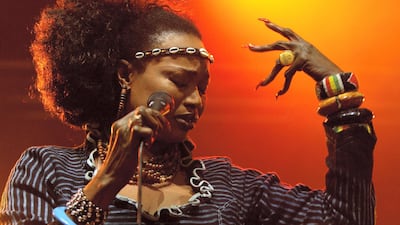The goal of Sharjah's recently rebuilt Africa Hall is to promote the African continent's intellectual, cultural and innovate spirit, and showcasing Oumou Sangare is a great start.
She is revered across Africa for her vocal style, and popular as a world music act internationally, but the Malian singer is also a successful entrepreneur and hotelier, and has even had a car brand named after her. However it is on stage, rather than in the boardroom, that the 50-year-old vocalist says she is most comfortable.
Fans of world music in the UAE can now check out her joyous blend of Malian folk-rock when she takes the stage on Thursday as part of Africa Hall's concert series to commemorate the venue's opening. "It is really about being free," she says. "I love the atmosphere of a live show. There is a lot of electricity in the air, people are excited to see you and you just want to put on a fun show for everyone. I take that part seriously."
I got a sense of that when I met Sangare an hour before she played in front of 10,000 people at the Mawazine Festival in Morocco recently. She invited me into her dressing room, which was a bustling hive of activity – her backing dancers dressed in colourful flowing dresses were continually darting in and out of the room carrying cosmetics, while members of the band were heard from the adjacent room practising the guitar and the ngoni – a west African stringed instrument.
_____________________
Read more: Four artists to see at Africa Hall in September
_____________________
In the middle of it all was Sangare, who looked resplendent in an eye-popping red dress embroidered with what looked like golden fur. She was in great spirits. Her Morocco show was part of a tour promoting her spirited new album Mogoya, which she believes has been embraced by a new generation of fans. "This is an album for the young people," she says. "I would be touring around Africa and they would tell me, 'We love your music, but when can we hear it and dance to it in the nightclubs?' I liked the idea of that."
Inspired by the notion of updating her traditionally rootsy sound, Sangare teamed up with a number of young beat-makers from Sweden, as well as the French production team A.l.b.e.r.t, who work in the worlds of electronic and pop music. Thankfully, Sangare has kept the experimentation light. The deep grooves and exuberant Malian rhythms that are intrinsic to her sound remain. The development can be heard through electronic additions – subtle house music beats, dollops of synth-keyboards and pristine production.
The audio clarity allows us to fully absorb the beauty of Sangare's voice. An unsubtle instrument, it easily glides to high registers, but is laced with a sensitivity that speaks of a proud music tradition. The powerful lyrics of the songs are in line with the Malian musical form of Wassoulou. Performed mostly by women, the genre is credited by music ethnologists as forming the DNA of the blues and has provided an important vehicle to discuss topics both relevant and taboo to Malian society.
Despite their upbeat nature, all the tracks in Mogoya tackle important issues ranging from the macro level – such as the plight of African refugees – to more localised issues including family breakdown in Mali.
The most startling example is in Yere Faga. Featuring legendary Nigerian afrobeat drummer Tony Allen and his signature polyrhythmic beats, the track is powered by a stalking bassline as Sangare pleads to struggling Malian women to choose life instead of suicide: "Life on earth is not easy, but no one should kill themselves," she sings. "Living among humans is challenging, but don't kill yourself / Today's people are not easy to live with, but don't take your own life."
Sometimes the medicine needs to be served sweet in order for it to be consumed, Sangare states. “When it comes to Wassoulou music, everything needs to work together,” she says. “There are the traditional instruments and sound at the base, but it also needs to have the right lyrics with it. You need to have something to say, a message to give or to educate.”
Sangare has also embodied that spirit in the world of business.
She owns and runs the 30-room Hotel Wassoulou in the outskirts of the Malian capital Bamako and has made a point of hiring women for key positions. In 2013, she partnered with a Chinese manufacturing firm to launch the “Oum Sang,” an affordable line of cars only available to buy in Mali, which have been used in the country as taxis. “The point of all of this is that I am trying to show what women can achieve by entering the workplace,” she says. “Before, there was not many examples of that, so here I am, showing what we also can do. That we can also achieve and how we can depend on ourselves to improve our living standards.
“I am now seeing women forming co-operatives, selling things they are making. These are all important steps.”
Oumou Sangare performs at Africa Hall, located opposite Sharjah Central Post Office, on Thursday at 9pm. Tickets cost from Dh60 and can be purchased online at www.ticketmaster.ae
_______________
Read more:
Sharjah celebrates opening of Africa Hall with concerts including Youssou N’Dour and Mulatu Astatke
Malian singer Fatoumata Diawara sings for the voiceless
Mandela Trilogy: The role of music in the anti-apartheid movement
Saad Lamjarred's case reopens Morocco violence against women debate
_______________


